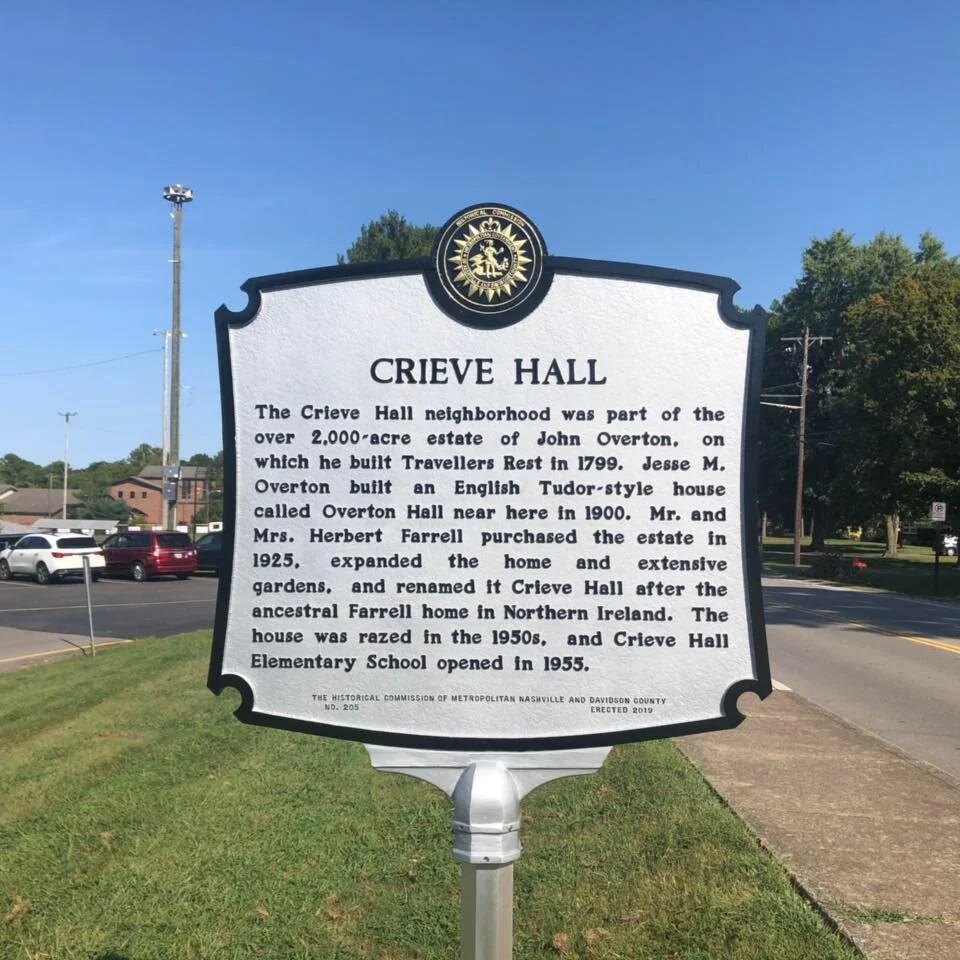The Crieve Hall neighborhood was part of the 2000-acre estate owned by John Overton, who built Travellers Rest in 1799. An English Tudor house, built in 1900 by Jesse Overton, was purchased and expanded by Herbert Farrell in the 1920s. Farrell renamed the estate Crieve Hall after his family's ancestral home in Northern Ireland. The home was razed in the 1950s.
From the book, "Nashville Interiors, 1866-1922" by Amelia Whitsitt Edwards, it was located on Stillwood Drive between Barrywood and Crieve Rd. When Herbert Farrell died in 1947, the land was sold to developers, and the house was razed by them.
From the archives of the Tennessean - "This mansion's dramatic 50-year rise and fall would rival any Hollywood epic. Built at great expense in 1900, it was razed for a subdivision by the early 1950s — simply because no one would buy it. In between, the house was expanded and refurbished even more lavishly. Elizabethan-era carved fireplace mantels, priceless wall tapestries and chandeliers were among the treasures installed by the decorator known simply as Charles of London.
All of it finally sold to the bare walls in a three-day 1951 auction that drew bargain hunters from across the country. By that time, roads for the new housing development had already been "gashed into the hillsides and fields" where horses' hooves once thundered on fox hunts. Today it's a thriving neighborhood known as Crieve Hall. At its start, it was a home on 433 acres fit for an heiress.
She was Saidee Williams, daughter of banker John P. Williams. Her family home downtown on Seventh Avenue North later became a Tennessee governor's mansion. Courting her there was Jesse Maxwell Overton, frequently seen arriving to take her for a ride in a coach pulled by fine horses, the late-1800s equivalent of a limousine. "It was elegant!" recalled Mrs. Avery Fall Handly, who watched as a young neighborhood girl, skating down their street just to catch a glimpse of the well-dressed Saidee.
Overton, a businessman and stockbreeder, married Saidee and built a Tudor brick home off Franklin Pike for her they called Overton Hall. It was on a part of his family's 3,600-acre Travellers' Rest plantation, known today for the historic house open to the public. Overton and others of wealth had earlier joined together to form Hermitage Stud, a 3,000-acre horse-breeding operation on both sides of Franklin Pike that was known throughout the country in the 1890s. After Overton's sudden death in a car accident in 1922, Overton Hall was sold in 1925. The buyers were equally well connected locally.
Herbert Farrell was a former Nashvillian who had made a fortune in the steel industry in Ohio. His wife was the former Ritchey Cheek, the only daughter of Joel Cheek, a beneficiary of the Cheek-Neal Coffee Co. fortune (Maxwell House) that made possible Nashville's Cheekwood mansion. The Farrells remade and improved Overton Hall, renaming it Crieve Hall after a family ancestral home in Northern Ireland. They added an elaborate formal garden with reflecting pool, replaced whole interior sections, re-plumbed and redecorated using the services of Charles "of London" Duveen, brother of a British lord.
Mrs. Farrell purchased and installed an entire room from Whitehall Palace in London, including carved oak paneling from the Charles I era. There were five Holland chandeliers for the hallway alone and a 17th-century Flemish tapestry for one wall. The couple had other homes in Palm Beach, Fla., and Ohio. But they maintained a staff of servants, fine horses and a fleet of cars including Rolls Royces and Mercedes-Benzes always ready whether they were here or not.
When Herbert Farrell died in 1947, his widow decided not to keep the Nashville place. With no buyer emerging quickly enough, she sold to a developer who razed the house to make way for new homes. The neighborhood that grew there took the name of the old mansion, Crieve Hall. Now well established, it is about nine miles south of downtown Nashville, two miles north of Brentwood and east of Franklin Pike. One of its streets is Farrell Parkway, named for the family. Ritchey Farrell died in 1978 in Palm Beach at age 93 and is buried in Nashville's Mount Olivet Cemetery. She left a family that included 15 great-grandchildren.
Additional links:
Nashville Public Library’s Historic home residence Overton Hall, Nashville, Tennessee, 1911



